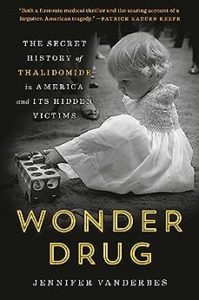WONDER DRUG by Jennifer Vanderbes
 This book blew my mind, people. With a huge cast of characters that spans the globe and many decades, WONDER DRUG is a compelling, must-read page-turner.
This book blew my mind, people. With a huge cast of characters that spans the globe and many decades, WONDER DRUG is a compelling, must-read page-turner.
It’s a tale of corporate greed, corruption, malfeasance, gaslighting, lack of oversight, cover-ups, fraudulent advertising, negligent testing, and lies upon lies. (Seriously.) But it’s also a story that reveals the best of humanity, especially amongst survivors who, despite living with multiple medical issues caused by Thalidomide, have created a supportive community and become activists. After sixty years, they struggle every day. One survivor described her body as a time bomb.
WONDER DRUG brings to life many heroic people from the past, people who risked careers and reputations to uncover the truth and share information. In America, a number of exceptional female scientists played vital roles in this horrific saga, including Frances Kelsey.
Frances was responsible for the FDA denying American approval for Thalidomide. However, Merrell had already distributed at least 2.5 million tablets of the drug to doctors nationwide in a casual, undocumented clinical trial.
Sales reps, or ‘details’ men, touted the wonders of Thalidomide to doctors who then shared it with other doctors. Pregnant woman were given envelopes of pills to combat morning sickness. They had no idea that they were taking an experimental drug. Some mothers only took one pill. That was enough to cause horrific birth defects.
But there’s plenty of blame to go around. Jennifer Vanderbes proves that five different drug firms shipped the drug around the country under different names and labels. An earlier unofficial trial, this one conducted by Smith, Kline, & French, linked the drug to severe birth defects. That information was not shared.
Test results were buried; parents’ concerns were ignored or simply cast aside. Merrell escaped without a single legal penalty, and the medical community closed ranks. Even today, the FDA denies that more than 10 children were affected by the domestic distribution of Thalidomide. That’s not true. Some US survivors have only recently learned their mothers took the drug in early pregnancy.
Worldwide, around 150,000 babies were affected by Thalidomide. One of those may have been my brother.
A few years before she died, my mother watched a BBC documentary about the drug. The next day she told me, “Those are the blue pills I was prescribed for severe morning sickness with Nigel.” My parents first child, Nigel died in 1958 at six months of age. He was born with spina bifida, one of the side effects of Thalidomide. Even though my mother had no idea what the pills were, she refused to take more when she was pregnant with my sister or me.
Thalidomide was withdrawn from England in 1961, the year of my birth. A sobering thought.